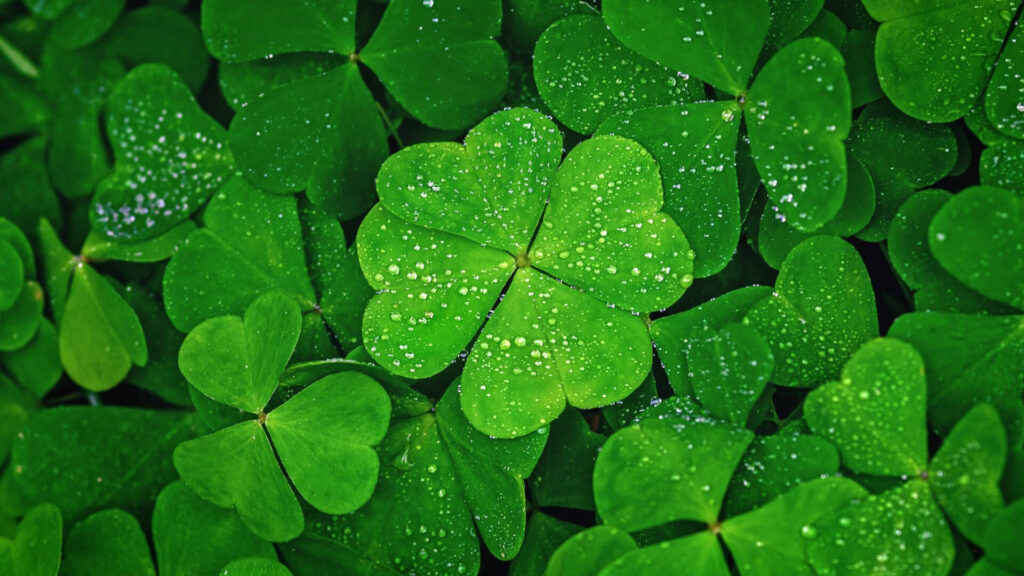Some amateur gardeners clover is a thorn in the flesh. But the plant has many advantages.
Clover, often considered a weed, can actually be a useful and beneficial plant in many situations. Here are some reasons why you might want to leave clover in your lawn or garden:
- Nitrogen Fixation: Clover, particularly white clover (Trifolium repens), has the ability to fix atmospheric nitrogen into a usable form through a symbiotic relationship with nitrogen-fixing bacteria in its roots. This process adds nitrogen to the soil, making it a natural and free source of fertilizer for your other plants.
- Ground Cover: Clover forms a dense, low-growing mat that can help suppress the growth of other weeds, reducing the need for herbicides or manual weeding.
- Drought Tolerance: Clover is more drought-tolerant than traditional grass lawns, making it a good choice for regions with limited water resources.
- Attracts Beneficial Insects: The flowers of clover are rich in nectar and attract pollinators such as bees and butterflies. Bees, in particular, are essential for pollinating many garden crops.
- Wildlife Habitat: Clover can serve as a valuable food source for wildlife like deer and rabbits. It also creates a microhabitat for smaller insects and invertebrates.
- Low Maintenance: Clover is easy to care for, requiring less mowing than traditional grass lawns. It also thrives in poor or compacted soils, making it a good choice for areas where grass may struggle.
- Aesthetic Appeal: Many people find clover lawns or mixed clover-grass lawns visually appealing. The white or pink flowers can add charm to your landscape.
- Soil Improvement: The roots of clover help improve soil structure by breaking up compacted soil and enhancing aeration and drainage.
- Edible and Medicinal Uses: Some types of clover, like red clover (Trifolium pratense), have edible leaves and flowers. They are also used in herbal medicine for their potential health benefits.
Despite the benefits of clover, it’s essential to recognize that some people may still prefer traditional grass lawns for their own reasons. Others may view clover as a weed because it can spread aggressively in some conditions. If you decide to keep clover in your lawn or garden, consider selecting low-growing varieties that blend well with grass, and manage its growth as needed to prevent it from becoming too invasive.
Ultimately, the choice to keep or remove clover in your lawn or garden should align with your specific goals and preferences.
For these reasons, the “weed” is useful.
Clover is even suitable as a good alternative to conventional lawns. At least for those places where a dense, green grass growth fails every year. As a result, the plant not only provides a gap-free green area, but also improves the soil of the garden at the same time.
The small green plants enrich nitrogen in the soil and even loosen it with their roots. Red and white clover flowers are also said to be a valuable source of nectar for insects such as bees and butterflies. Dandelions should not be removed either, as they can also be helpful.
White clover is the variety most commonly found in lawns. Its leaves are edible and are said to be good for salads. Another advantage is that weeds and moss have little chance in places where clover grows.
Do not remove clover: these simple tricks will take care of the clover lawn.
Maintaining the clover lawn is easy, as it only needs to be watered once a week. Fertilizing the plant, on the other hand, is not necessary. As soon as the clover forms flowers, it has the opportunity to sow itself
But the clover can also be sown by amateur gardeners. Microclover is said to be particularly suitable for this purpose. This is currently in vogue as a lawn alternative and is no longer unknown to many gardeners. Microclover is a modern cultivation of white clover. It has a lower growth habit, small leaves and grows particularly densely. If the clover still bothers you, it can also be removed in a few steps if you are in doubt.
Removing clover in the garden: quite simple with a few tips and tricks.
This can be done by dethatching the lawn and reseeding vacant areas. Individual plants can also be removed with a so-called weed cutter. This should succeed best after it has rained and the soil is moist. It should be noted, however, that clover can never be properly avoided. This is due to the fact that it is spread by both the wind and insects.

However, to best avoid it, the lawn can be fertilized and watered regularly. Mowing the lawn can also help so that the clover does not even begin to bloom. Gaps in the lawn can also be reseeded directly so that clover does not spread there.


